Most people may not automatically equate energy drinks with health. These beverages are often loaded with added sugars, artificial food dyes, and flavorings, and enough caffeine to raise the dead from their sleep.
That being said, some established brands have also released healthier versions of their products with fewer or zero calories, less caffeine, and no added sugars. How do these compare to newer brands and could they be even healthier than their predecessors?
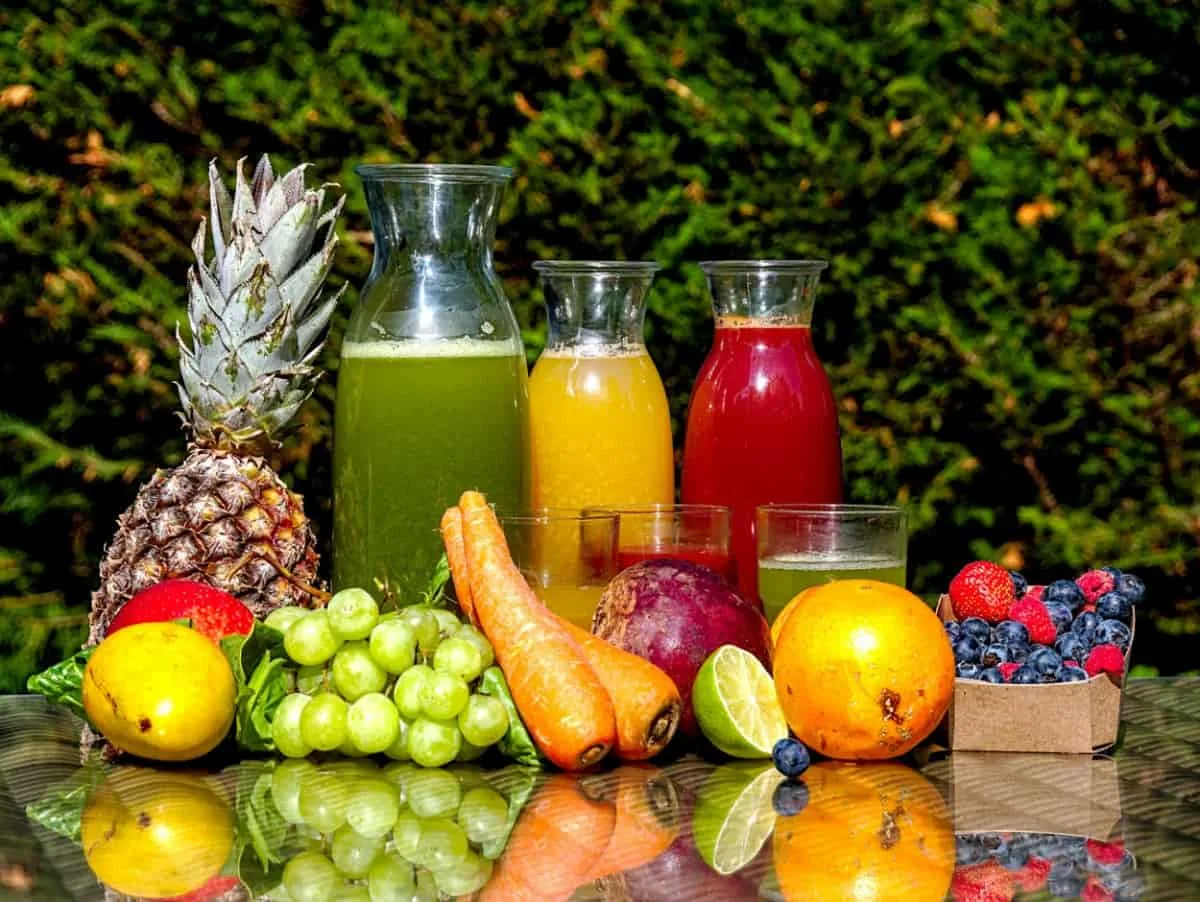
From my research, I have found that the healthiest energy drinks from well-known brands are: AMP Sugar-Free, Game Fuel Zero Sugar, Aspire, and RedBull Zero and RedBull Sugar-Free. But if you are interested in trying out new brands that are just starting out, I recommend EBoost, MatchBar, Mati, Runa, and ToroMatcha.
In this article, I’ll talk not only about the healthiest energy drinks currently on the market but also what makes an energy drink healthier than others, and what to look for if you’re currently trying to find better options.
Contents
Are Energy Drinks Healthy?
While a majority of brands like Red Bull, Monster, and Mountain Dew Amp are not known to be the healthiest options for most people, there are some natural energy drinks in the market that are not only sugar-free but also made from safe and calorie-free ingredients.
However, in general, energy drinks are not healthy because, more often than not, you’ll see over 10 teaspoons of sugar in a single serving, and caffeine in doses up to 400mg or more (which is the maximum amount of caffeine you can ingest in a day without experiencing adverse side effects).
I will be explaining these ingredients in more depth in the following sections.
Other supplements like vitamins, nootropics (theanine, carnitine, creatine) and natural plant extracts (ginkgo biloba, guarana) rarely pose any threat to your wellbeing if administered in the proper doses, unless you are somehow allergic to them which very few people are.
If you want to know more about how to choose healthier energy drinks while you’re at the store, watch this video:
Energy Drinks Nutrition Facts
One way that you can determine whether an energy drink is healthy or not is by looking at its nutrition label. An energy drink can make all kinds of claims but at the end of the day, what’s stamped on the back of the can will reveal all the dark and ugly truths about what a brand may be trying to hide
Energy drink nutrition labels typically list down six major nutrition facts: calories (sometimes also referred to as “energy”), carbohydrates (including added sugar), fat, sodium, and vitamins (if any).
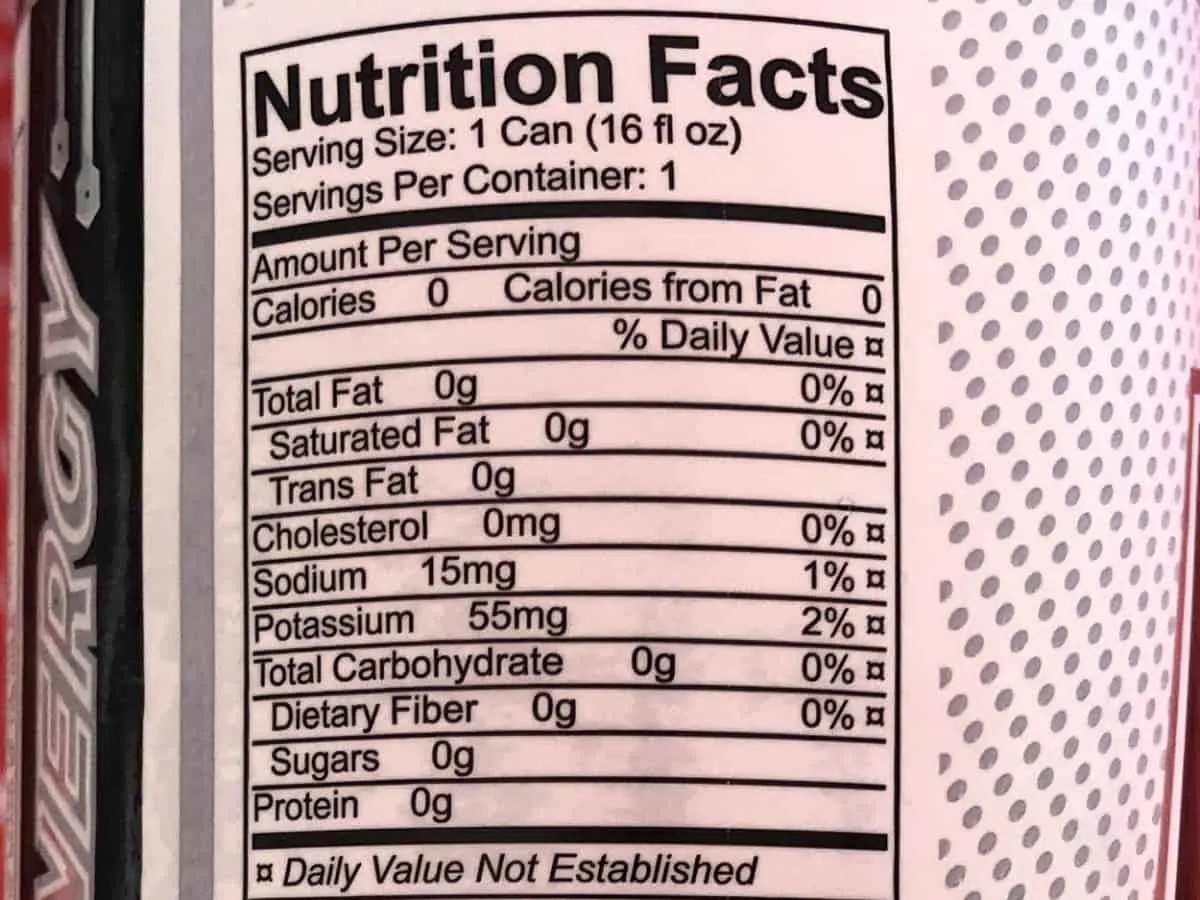
Some brands may also display the protein, fiber, and cholesterol content as well, but as far as energy drinks are concerned these nutrition facts don’t make that much of a difference.
All food and beverage products are required by law to display their nutrition facts, and this is where you must look to see if you have any concerns about whether an energy drink is healthy for you or not.
A healthy energy drink should ideally have zero calories, zero fat, zero carbs, zero sugar, and zero sodium (although sodium can be the exception as it may function as an electrolyte in moderate doses).
But calories up to 100 are generally considered safe, and should not exceed that cut-off point. Sugar content should ideally fall between 0 – 10g per serving.
Energy Drink Ingredients
Some ingredients have become so synonymous with energy drinks that it’s almost impossible to find a brand that does not contain either caffeine, sweeteners, B vitamins, or supplements.
As such, it’s better to pick out the ingredients you want to focus on, and try to find energy drinks that exclude some of the more egregious ingredients present.
Caffeine
Caffeine is essential in the energy drink world. Its role as a supplement is manifold, it is an energy-booster, a mood-enhancer, a fat-burner, and a nootropic.
Caffeine can also boost physical and cognitive performance, improve memory and mood, and also burn fat, and aid in weight loss.
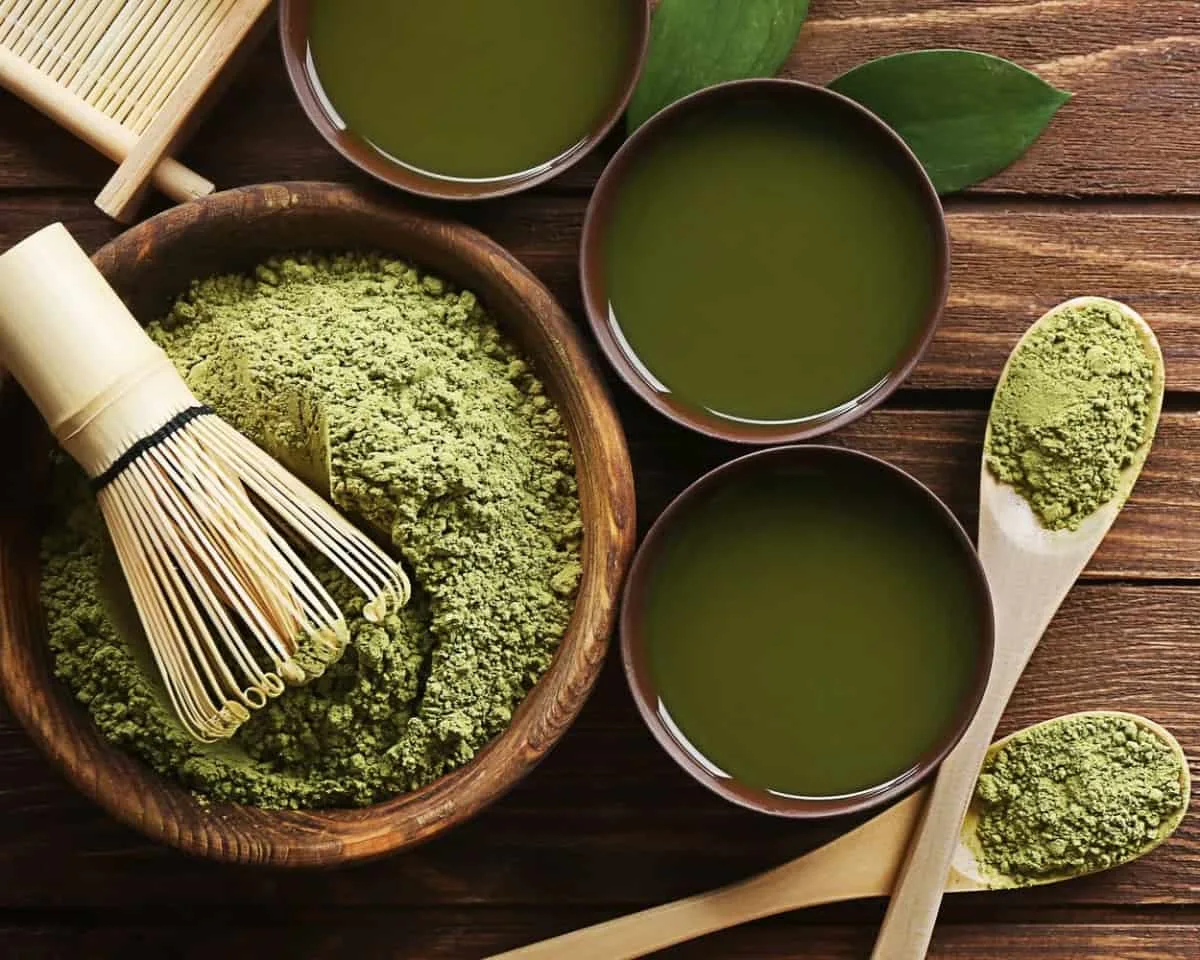
But what it gives it takes back twice as much, because consuming caffeine too frequently can cause a plethora of unpleasant side effects like headaches, insomnia, heart palpitations, jittery hands, anxiety, and depression.
Stay off coffee too long after drinking it regularly can also lead to violent withdrawals, oftentimes resulting in the same side effects you would normally experience from overconsuming it.
A healthy energy drink should ideally not have more than 200mg of caffeine per serving to avoid potentially lethal consequences of the likelihood of people being tempted to drink multiple cans consecutively.
Many have perished from drinking heavily caffeinated energy drinks in succession, and those who have been lucky enough to survive end up in the emergency room.
Sweeteners
Energy drinks often contain a lot of sweeteners. Less scrupulous brands may use straight-up high fructose corn syrup and bleached white sugar in inordinate amounts.
But those who may wish to appeal to the health-conscious individuals in society may swap the sugars out with artificial ones like sucralose and aspartame.
A lot of people have cast some doubt over these synthetic sweeteners, citing damning research that points to potentially cancerous properties even though there is still not enough scientific evidence to back up these claims.
However, thanks to advancements in the wellness industry, many energy drinks brands are now opting for calorie-free sweeteners naturally derived from botanical sources like stevia and monk fruit extract.
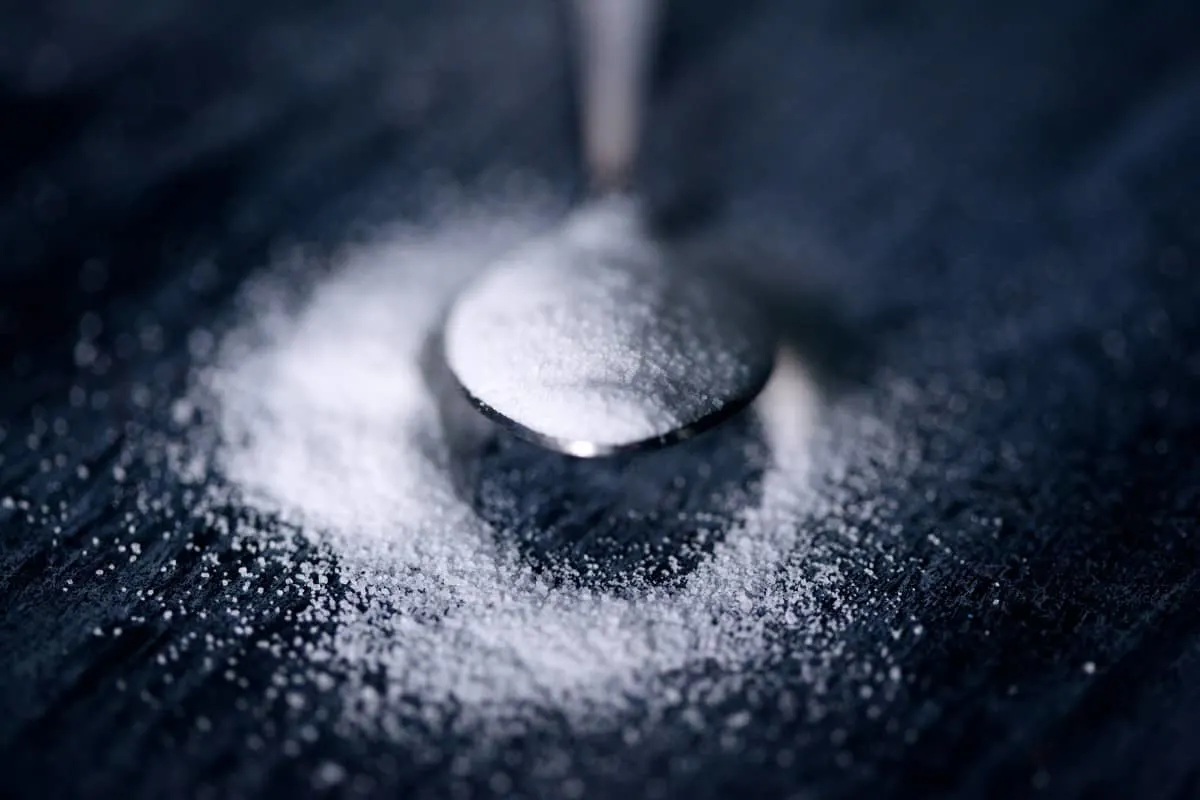
A healthy energy drink should ideally contain these botanical sweeteners which are not only calorie-free but also have no effect on blood sugar, making them the perfect option for weight-watchers, diabetics, and fitness junkies looking to keep those extra inches off.
Vitamins
The most popular vitamin family that has become synonymous with energy drinks is B vitamins, which a lot of people believe can give you an instant surge of energy. Contrary to popular belief, that’s not how vitamins work.
While B vitamins do help maintain the natural biological system in your body responsible for generating and regulating energy, they don’t provide energy by themselves. B vitamins support the processes in your body that are in charge of converting food, glucose primarily, into energy, in the form of energy (ATP).
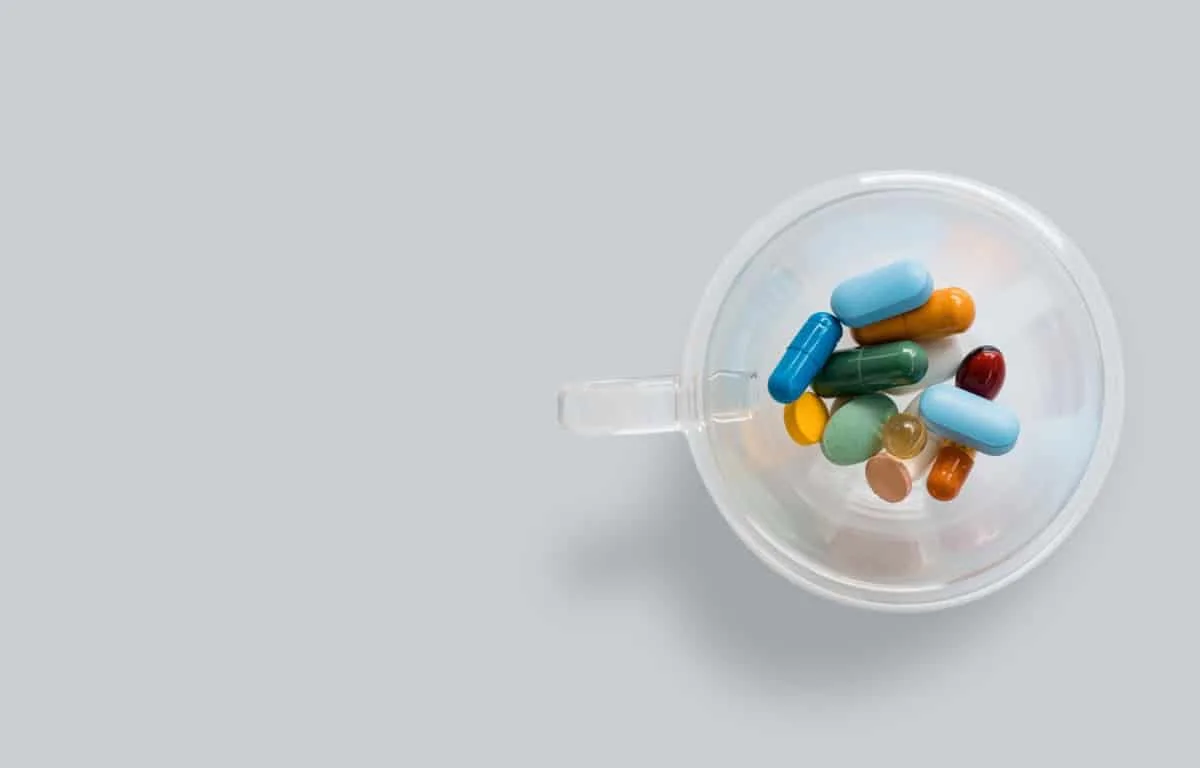
If you are not deficient in B vitamins, taking more won’t necessarily improve your physical performance or your energy levels, although apparently taking it in high doses won’t negatively impact you either because being a water-soluble vitamin, they do not linger in the body and get flushed out as soon as you go to the toilet.
However, I can’t say the same for fat soluble vitamins like vitamins A, D, E and K which can linger in the body for long periods of time.
Consuming fat soluble vitamins in doses above the recommended intake or percent daily value can increase your chances of developing hypervitaminosis or vitamin overdose, which typically manifests as drowsiness, irritability, abdominal pain, nausea, and vomiting.
A health energy drink should ideally have a safe amount of fat-soluble vitamins.
Supplements
The supplements that companies put in their energy drinks depend on the target demographic or “audience” that they wish to cater to. Popular niche categories include fitness, sports and bodybuilding, gaming and e-sports, and dietary (keto, vegan, gluten, etc.)
Fitness energy drinks often have a lot of electrolytes like dextrose monohydrate and supplements designed to improve physical performance and aid in muscle recovery like EEAs, creatine and beta-alanine.
Weight loss products targeted towards female consumers may also have thermogenic botanical ingredients like ginger, garcinia cambogia and green tea.
Gaming energy drinks often contain a subcategory of supplements known collectively as nootropics, which are ingredients that purportedly possess brain-boosting powers, able to enhance your alertness, concentration, reaction time, memory and other cognitive functions.
Examples of nootropics include:
A healthy energy drinks should ideally have a safe amount of supplements that are safe for human consumption.
Healthiest Energy Drinks from Well-Known Brands
The following table contains a list of all the typical and popular energy brands you may see displayed on the canned beverage aisle of your local 7-11. These options are generally much cheaper than natural, plant-based energy drinks with proprietary formulation.
| Brand | Caffeine | Price (Average) |
| AMP Energy Sugar-Free | 71mg | $1.50 (single) |
| Game Fuel Zero Sugar | 72mg | $23 (12-pack) |
| Red Bull Zero/Sugar-Free | 80mg | $2.50 (single) |
| Aspire Energy | 80mg | $24 (12-pack) |
Healthiest Energy Drinks from New Brands
The following are a list of healthy energy drinks from more recent brands that you may not have heard of. If you are looking to try something new or if the older brands are not your cup of tea, give these a try.
EBoost Super Fuel
Eboost is an energy drink catered to the working class and fitness junkies. It contains 110mg of caffeine, only 10 calories, 2 g carbs (0 g fiber, 1 g sugar) 0 g fat, 0 mg sodium, and 0 g protein.
It is vegetarian, gluten-free, soy-free and keto-friendly. Flavors include Strawberry Lemonade, Ginger Lime, and Orange Mango. A six pack costs $20.
It is formulated with an energy recovery blend that various stimulants, electrolytes, nootropics and supplements.
The natural caffeine extracted from green coffee beans and green tea gives you energy without the jitteriness or crash and huperzine-A, resveratrol and Griffonia simplicifolia seed extract for sharpness, stress regulation and mood support.
Hovenia dulcis and milk thistle helps with hangover recovery. It is sweetened with the botanical sweetener, steviol glycosides.
MatchaBar
MatchaBar Hustle is a clean, plant-based energy drink that provides sustained, balanced energy without the crash or jitters. It contains 120mg of caffeine, 5 calories, 4g of sugar.
MatchaBar Unsweetened contains zero sugar. It is vegan, paleo, and keto friendly. Flavors include Lemon Lime, Berry, Mint and Peach. A 12-pack costs $39.
MatchaBar is formulated with ceremonial grade matcha powder which is rich in L-theanine, natural caffeine and antioxidants (flavonoids, flavonols, and phenolic acids) to supply you with energy and focus. It is sweetened with the botanical sweetener, monk fruit extract.
Runa
Runa is a natural, plant-based energy drink made with brewed guayusa tea leaves. It contains 150mg of caffeine, only 10 calories, 3g of carbohydrates of which is 2g of added sugar, 10mg of sodium, and 0g of protein. It is vegan, gluten-free, organic, non-GMO and kosher.
Flavors include Blood Orange, Berry Boost, Lime Twist and Watermelon Focus. A 12-pack costs $34.
Runa is made from guayusa leaves, which grows in the Amazon rainforest and cultivated by indigenous tribes for centuries. Guayasa is a rich source of natural caffeine, phenolic antioxidants that can provide long-lasting energy without the caffeine crash. It is sweetened with natural sugar cane juice.
Mati
Mati Sparkling Organic Energy Drink is a natural, organic and plant-based energy drink that is made from “three ingredients only: guayusa tea, fruit juice and carbonated water. It contains 115mg of caffeine, only 40 calories, 9g of carbs of which are 7g of natural sugars, less than 1g of protein, and 0mg of sodium.
Mati is vegan, gluten-free, organic, and non-GMO. Flavors include Citrus, Passion Fruit, and Peach Mango. A 12-pack costs $32.
Just like Runa, Mati is made from guayusa leaves which are rich in natural L-theanine to keep the mind calm and focused, and theobromine to give you clean sustained energy without the jitters or the crash. It is packed with heart-healthy antioxidants.
ToroMatcha
ToroMatcha is a natural, plant-based energy drink that is formulated with Japanese Uji matcha and natural ingredients that is guaranteed to provide you with hours of energy without the jitters or the crash.
It contains 60mg of caffeine, only 10 calories, 2g of carbohydrates of which are zero added sugar, 0g of fat, 0.3g of protein, and 15mg of sodium. ToroMatcha is sugar-free, keto-friendly, vegan, organic. Flavors include Mango, Pineapple, Peach and Ginger. It is naturall sweetened with. A 12-pack costs $40
It is naturally flavored with organic lemon and ginger juices. It is only sweetened with the natural fruit juices used to flavor the product.
What is the healthiest Monster drink?
If you are looking for a relatively healthier option among Monster drinks, you can consider Monster Zero Ultra. This product contains no sugar and no calories, and it is formulated with a blend of B vitamins, taurine, and caffeine to help increase alertness and focus.
It’s important to note that while Monster Zero Ultra is a relatively healthier option among Monster drinks, it’s still a highly processed beverage that should be consumed in moderation. Additionally, it’s always a good idea to balance the consumption of energy drinks with other healthy behaviors, such as getting enough sleep, exercising regularly, and eating a balanced diet.
Is Red Bull or Monster better?
Both Red Bull and Monster are popular brands of energy drinks that are designed to provide a quick boost of energy and focus. Whether one is “better” than the other depends on individual preferences and needs.
In terms of caffeine content, Monster generally contains more caffeine than Red Bull. A 16-ounce can of Monster contains around 160 milligrams of caffeine, while an 8.4-ounce can of Red Bull contains around 80 milligrams of caffeine. This means that Monster may be a better choice for people who are looking for a stronger caffeine kick.
On the other hand, Red Bull is often marketed as a sports drink and is popular among athletes. It contains additional ingredients such as taurine, B vitamins, and amino acids, which may help improve physical performance and endurance. Additionally, Red Bull has a slightly lower sugar content than Monster, which may be a better option for people who are watching their sugar intake.
In terms of taste, both drinks have a variety of flavors to choose from, and preferences can vary widely depending on individual tastes.
What is better than energy drinks?
While energy drinks can be a convenient way to boost your energy and focus, they are not considered healthy beverage due to their high sugar and caffeine content. If you’re looking for alternatives to energy drinks, here are a few options:
- Water: Drinking water is one of the best ways to stay hydrated and maintain your energy levels. Aim to drink at least eight glasses of water per day to help keep you feeling alert and focused.
- Tea: Tea is a great alternative to coffee and energy drinks, as it contains less caffeine but still provides a boost of energy. Additionally, tea is rich in antioxidants, which can help protect your cells from damage.
- Natural fruit juices and smoothies: Natural fruit juices and smoothies can provide a quick boost of energy and are a good source of vitamins and minerals. However, it’s important to choose juices and smoothies that are made with fresh fruits and vegetables, as many store-bought varieties are high in sugar.
- Healthy snacks: Snacking on healthy foods can help keep your energy levels stable throughout the day. Try snacking on foods such as nuts, seeds, fresh fruits, and vegetables, or whole grain crackers.
Conclusion
As you can see, these energy drinks are low in or entire free of calories and sugar and contain low amounts of caffeine, nothing higher than 200mg per serving. They are also naturally sweetened with either fruit juices or botanical sweeteners like stevia and monk fruit extract.
Moreover, these healthier energy drinks also contain ingredients like match and guayusa as their caffeine source, which are less aggressive than normal caffeine. Other caffeine sources that can provide clean, long-lasting energy without crashes or jitters include guarana and Yerba maté.
These lists are by no means exhaustive, and with some quick research, you can easily find dozens of other brands that can do not contain atrocious amounts of sugar and caffeine.
While a significant portion of the general population has become more health-conscious, a large percentage of that number is still widely ignorant of the potential dangers of energy drinks.
Hopefully, with this careful selection of healthier options, you may be able to enjoy energy drinks without putting your wellbeing at risk from the unnecessary added sugars and caffeine that can negatively affect your health.
